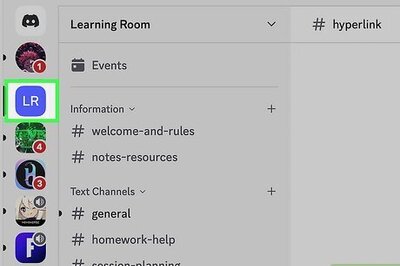
views
What does engine code P0456 mean?
Code P0456 means “EVAP system leak detected (very small leak).” This diagnostic trouble code (DTC) indicates that there is a small leak in your evaporative emissions (EVAP) system. While you’re driving, your engine control module (ECM) performs specific tests to ensure your EVAP system is holding the correct amount of vacuum pressure. If that pressure drops below a certain point, the ECM will display a trouble code that will appear when your vehicle is scanned with an OBD-II scanner. Your check engine light may come on if your car detects a leak in the EVAP system.
What could be causing code P0456?
A loose gas cap is a common cause of code P0456. If your gas cap isn’t sealed tightly, your EVAP system won’t pressurize correctly, which can cause your vehicle to throw code P0456. In some cases, simply tightening the fuel cap will fix the problem. If your fuel cap doesn’t seal tightly enough, even when you tighten it, you may need to replace it with a new one.
There could be a leak in your evaporative emission system. Your EVAP system is a pressurized system that keeps gas vapor from leaking out of your vehicle. If there’s a leak in that system, toxic fumes can be released into the atmosphere, causing pollution. When it’s working properly, the EVAP system directs those fumes into your intake manifold so they can be burned up with your fuel.
Faulty seals, sensors, or solenoids could also be to blame. Your EVAP system needs to be tightly sealed all the way throughout. If a seal in the EVAP system is leaking, you’ll likely see code P0456. There could also be an issue with the solenoids that control how much fuel vapor is held in your engine. The problem could also be with the engine control module (ECM) or sensors that monitor your EVAP system. In some cases, the problem may be with the software running on your vehicle’s computer. A software update may fix the issue.
Does code P0456 mean there’s a serious problem with my car?
Fuel leaks are a serious issue, but the fix could be simple. If you have a leak in your EVAP system, your car could be emitting toxic fumes. You probably won’t pass an emissions test, and if the problem isn’t fixed, the leak could worsen, impacting your fuel efficiency. If you’re seeing code P0456 because your fuel cap is loose, the problem isn’t serious—you just need to tighten your fuel cap and the code should go away.
Can I still drive if my car is displaying engine code P0456?
You can still drive unless you smell fuel or notice engine trouble. Because a loose fuel cap is one of the more common reasons you’ll see P0456, you don’t have to park your car right away. Try tightening the gas cap, then drive as usual for 2 or 3 days to see if the code clears. If it doesn’t, replace the gas cap. If the code is still there after a few days, take your car to a mechanic to have the problem diagnosed. P0456 indicates a very small leak, so it’s unlikely you’ll notice any unusual smells or engine trouble. But if you do, you should stop driving and consult a mechanic.
Can I pass emissions if my car shows P0456?
You’ll probably fail an emissions test with code P0456. The point of an emissions test is to make sure your car isn’t emitting toxic gas fumes into the atmosphere. Because code P0456 indicates an emissions leak, you’ll need to resolve the issue before you can pass emissions.
Can I fix code P0456 myself?
Tighten or replace your gas cap to see if that helps. If you take your car to the mechanic with code P0456, the first thing a mechanic will do is to try tightening your gas cap. Save yourself the trip and try this yourself—tighten the fuel cap securely by hand, then check whether the code is gone after you drive for a few days. Don’t over-tighten the gas cap, as you could crack the cap or damage the seal. If the gas cap doesn’t seal when you tighten it by hand, replace it with a new one. Use an OEM gas cap, or one provided by your vehicle’s manufacturer, to ensure a precise fit. See a mechanic if the code doesn’t go away after tightening and replacing the gas cap, or if you smell fuel or notice any unusual sounds, smells, or driving issues.
How will a mechanic diagnose and repair code P0456?
First they’ll check for any technical service bulletins for your vehicle. Technical service bulletins, or TSBs, are notices sent out by vehicle manufacturers or safety organizations that could indicate a part recall or common failure. When you bring your vehicle in to a mechanic because it’s displaying an error code, they’ll usually pull up these TSBs first to see if there could be a known cause specific to your make and model. For instance, a faulty power control module (PCM) could cause an erroneous P0456 code. In this case, the mechanic would probably recommend replacing the PCM first, although they may run other diagnostic tests to be sure.
They’ll visually inspect your vehicle to try to find the leak. If your mechanic suspects that code P0456 is actually caused by a leak in your EVAP system, they’ll typically perform a close inspection of your fuel cap and your evaporative emissions hoses. Sometimes, the cause of an EVAP leak will be obvious, like a faulty seal around your gas cap, a damaged hose, or a cracked fuel tank. In this case, further testing might not be needed.
The mechanic will perform pressure tests to locate the leak. If the mechanic can’t find the cause of the leak with a visual inspection, they may use a specialized hand pump to identify where the system isn’t holding vacuum pressure. They’ll disconnect the parts of your EVAP system one at a time and connect them to the pump. If one of the parts isn’t holding pressure, they’ve found the source of the leak. This can be time-consuming and may involve removing the fuel tank assembly from your vehicle. The longer it takes the technician to locate the leak, the more you’ll likely pay in labor costs.
Your mechanic may also perform a smoke test to locate a leak. Some mechanics will also hook the EVAP system up to a smoke machine. If the system is properly pressurized, the smoke will stay in the EVAP system—so if they see smoke coming up from the vehicle, they can identify an EVAP leak. They can then locate where the smoke is emerging to pinpoint the source of the leak. The technicians may need to perform multiple smoke tests, removing parts of your vehicle during the process.
They’ll repair the leak or replace the faulty parts. Once your mechanic locates the source of the EVAP leak, they’ll either repair or replace the part as needed. If the pressure and smoke tests didn’t find a leak, they may suggest replacing the engine control module (ECM), which is the control system that monitors the EVAP system. Your mechanic may be able to use a special tool to force your ECM to run the EVAP test again. If the problem is fixed, this should clear code P0456.
How much does it cost to fix code P0456?
Replacing your gas cap could cost $20 or less. A new OEM gas cap—meaning one that’s manufactured specifically for your vehicle by your manufacturer, rather than a generic one—can cost anywhere from $10 to $20. It’s an inexpensive fix, and a good first option if you’re trying to clear code P0456.
It can cost $100–$200 to diagnose the cause of P0456. Small EVAP leaks can be hard to find—a large leak might have an obvious cause, like a broken hose or cracked fuel tank, but a smaller leak could be caused by something as tiny as a pinpoint hole. Finding the exact cause of P0456 can sometimes require extensive testing, so the diagnostic part of your repair bill could be as much as $200 or more.
The repair can cost less than $50 or more than $500 for parts. Sometimes fixing code P0456 is as simple as replacing a small piece of hose or a rubber gasket—parts that don’t cost very much. However, if you have a cracked fuel tank or damage to the fuel filler neck, you could be looking at several hundred dollars in parts. The cost of labor will vary depending on where you live and which repair shop you choose.
How do I clear P0456?
Code P0456 will often clear by itself once the problem is fixed. The only way for P0456 to be cleared is for the system to run a check and determine that there isn’t a leak anymore. So if you tighten your gas cap and the EVAP system is sealed, the code should clear automatically.



















Comments
0 comment